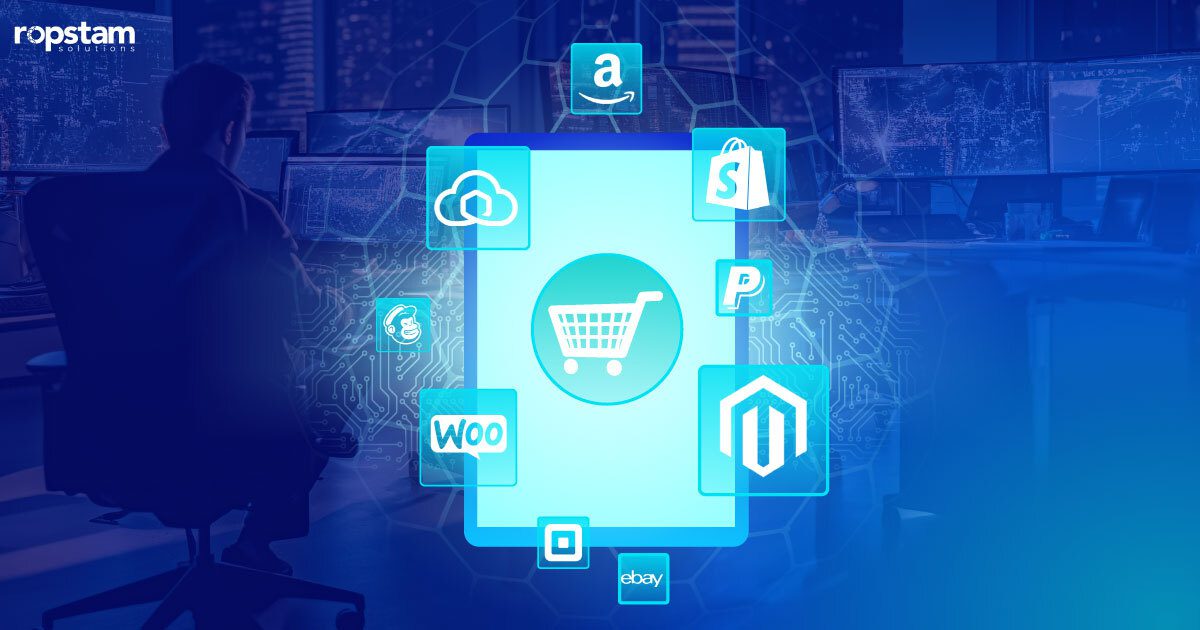With the ever-increasing importance of creating high-quality ecommerce sites, the pertinence of Application Programming Interfaces (APIs) cannot be overstated. Instead of manually writing and managing each and every line of complex code, ecommerce developers can make their lives easier by implementing APIs and adding useful functionalities to enhance the user experience.
Irrespective of the type of functionality you want to introduce in your e-commerce site, there is – more likely than not – an API to simplify that task. From building online stores to managing payment processing, the marketplace has a multitude of APIs – consequently, selecting one might become a headache.
Lucky for you, here I have compiled and categorized a list of the best e-commerce APIs to guarantee the success of your online store.
Different types of ecommerce APIs
Here are the types of ecommerce platform APIs that developers can use to make their work easy:
Payment APIs
Payment APIs allow for the processing of online payments, providing multiple payment options for customers.
Shipping APIs
Shipping APIs offer real-time shipping rates and tracking information, which helps to enhance the customer’s shopping experience.
Product Information Management (PIM) APIs
Product Information Management (PIM) APIs facilitate the management of product information across various sales channels, ensuring consistency and accuracy.
Customer Relationship Management (CRM) APIs
Customer Relationship Management (CRM) APIs enable businesses to manage customer data and enhance customer relationships.
Marketing APIs
Marketing APIs allow for the integration of marketing tools, helping businesses to better promote their products and services.
Most essential ecommerce APIs for developers to use
When it comes to the types of Ecommerce APIs, they can be categorized based on the functionality they provide. Let’s analyze some of the most useful APIs in this domain:
| Category | Ecommerce APIs |
| Store Builder APIs | WooCommerce
Shopify Magento |
| Marketing APIs | Salesforce
Mailchimp
|
| Payment APIs | PayPal
Stripe Amazon Pay Square |
| Marketplaces APIs | Amazon
Google Shopping eBay |
| CRM Platform API | HubSpot E-commerce Bridge |
| Shipping Ecommerce API | Sendcloud |
Store Builder APIs
1) WooCommerce:

Credits: WooCommerce
WooCommerce is a highly popular, open-source e-commerce plugin specifically designed for WordPress. It allows the transformation of a regular WordPress site into a fully functional e-commerce platform. WooCommerce offers features like product listing, shopping cart management, and payment processing. It also supports various extensions for improved functionality.
Not to mention that this API is ideal for businesses that aim to leverage WordPress’s power and flexibility for their online store, offering a cost-effective way to break into the e-commerce market.
2) Shopify:
Shopify is an all-inclusive, user-friendly, one-of-its-kind e-commerce platform that enables entrepreneurs to start, grow, and manage an online business. With Shopify, businesses can create a customized online store and manage products, inventory, payments, and shipping effortlessly.

Credits: Shopify
Talking about the API of this familiar platform, its API allows for the integration of third-party services to enhance store functionality. Shopify’s simplicity, coupled with robust features, makes it an ideal choice for businesses of all sizes, particularly for those just starting their e-commerce journey.
3) Magento:

Credits: Magento
Magento, owned by Adobe, is a feature-rich, powerful e-commerce platform built for scalability. Its robust API allows developers to integrate complex features like customer segmentation, personalized product recommendations, and advanced analytics. Moreover, Magento’s API is designed to handle high traffic volumes, making it an amiable choice for large-scale businesses that require a resilient and adaptive e-commerce solution.
Marketing APIs
4) Salesforce:

Credits: Salesforce
Salesforce Commerce Cloud is a cloud-based e-commerce website equipped with AI-powered features. By employing its powerful API, you can get access to features such as managing product information, customer service, marketing, and more.
Furthermore, Salesforce’s sophisticated AI tools offer personalized shopping experiences, making it an excellent choice for medium to large businesses seeking to leverage AI’s potential for their e-commerce operations.
5) Mailchimp:

Credits: Mailchimp
Mailchimp, renowned for its email marketing service, also offers an API that integrates a multitude of e-commerce features like automated product recommendations, purchase follow-ups, and customer re-engagement emails. Consequently, this integration allows businesses to nurture leads and convert them into customers, making Mailchimp a powerful tool for boosting e-commerce sales and enhancing customer relationships.
Payment APIs
6) PayPal:

Credits: Paypal
PayPal – a well-known platform for facile payment between two parties – boasts a powerful ecommerce API providing businesses the ability to integrate PayPal’s secure and reliable payment method into their e-commerce sites.
It supports an array of payment options, including credit and debit cards, and ensures secure transactions with fraud detection features. PayPal’s global recognition and trust make it a preferred choice for businesses looking to offer a familiar and trusted payment method.
7) Stripe:

Credits: Stripe
Stripe provides a suite of APIs that allow businesses to accept online payments, providing a versatile solution for e-commerce platforms. It offers robust features like subscriptions, on-demand marketplaces, and custom checkout experiences. Stripe’s powerful e-commerce API design can handle complex transactions, making it ideal for businesses requiring a flexible and robust payment solution for their e-commerce platforms.
8) Amazon Pay:

Credits: Amazon
Amazon Pay’s API empowers businesses to integrate Amazon’s reliable and secure payment system into their own e-commerce platforms. By offering a familiar and convenient checkout process, businesses can improve user experience, boost conversion rates, and enhance customer trust. The API also supports the use of Amazon’s advanced fraud detection systems, offering an added layer of security to your online transactions.
9) Square:

Credits: Square
Square’s API provides the tools for developers to craft custom payment solutions tailored to their client’s business needs. From facilitating online payments to managing in-person transactions, it offers a seamless and streamlined checkout process.
The API can be fully integrated with your e-commerce platform, enabling businesses to offer a unified shopping experience. Its robust features make it an ideal choice for businesses of all sizes looking to simplify their payment processes.
Marketplace APIs
10) Amazon:

Credits: amazon mws
Amazon Marketplace Web Service (MWS) API offers sellers a means to programmatically exchange data on listings, orders, payments, and reports. Without a shadow of doubt, this API is a powerful tool for sellers seeking to increase efficiency and improve response times to customers.
By automating various aspects of the selling process, businesses can focus more on enhancing customer service and less on routine tasks, directly contributing to increased profit of the company.
11) Google Shopping:

Credits: Google
Google Shopping API allows businesses to list their products on Google’s shopping platform, increasing their visibility to potential customers. This API is an invaluable tool for businesses looking to drive more traffic to their site. By making their products easily searchable on one of the world’s most popular search engines, businesses can significantly increase their reach and improve sales.
12) eBay:

Credits: ebay
eBay’s API provides developers with the ability to create applications that seamlessly integrate with the eBay platform. It allows for the comprehensive management of inventory, orders, and sales, enabling businesses to reach eBay’s vast global customer base. By leveraging eBay’s API, businesses can effectively tap into a new sales channel and potentially increase their revenue.
CRM Platform API
13) Hubspot Ecommerce Bridge:

Credits: HubSpot
The Hubspot Ecommerce Bridge API provides a powerful connection between your e-commerce platform and Hubspot’s marketing and sales tools. This API enables synchronization of customer and order data, enabling personalized marketing campaigns, efficient sales processes, and enhanced customer service.
Ideal for businesses seeking to improve their customer relationship management, this API provides an effortless integration that can drive sales and enhance customer experiences.
Shipping Ecommerce API
14) Sendcloud:

Credits: Sendcloud
Sendcloud is an all-in-one shipping platform for e-commerce businesses that simplifies the shipping process. Its ecommerce platform API allows businesses to automate and streamline their shipping operations by connecting multiple carriers to their online store. This revered API supports label creation, tracking, returns, and more, making it a comprehensive solution for managing shipping tasks.
In short, Sendcloud’s API is ideal for e-commerce businesses looking to create an efficient and customer-friendly shipping process. By integrating this API, businesses can enhance their operational efficiency, improve customer satisfaction, and ultimately boost their bottom line.
How to choose an ecommerce API?
Selecting the right Ecommerce API for your business website can be a game-changer – the difference between increased sales and a failed project. With the correct API, you can enhance your site’s functionality, enhance ecommerce operations, and provide a significantly better user experience.
Here are some factors you must consider when choosing an E-commerce API:
1) Determine your needs
Before diving into the selection process, it’s essential to define what you need from an API. Are you looking for payment processing, shipping management, customer relationship management, or all of the above? The type of API you choose depends on the needs of your business. Take into account your business model, size, target audience, and future growth plans.
2) Check API documentation
It is an undisputed fact that a well-documented API is easier to implement and troubleshoot. Therefore, you should look for APIs with comprehensive, clear, and updated documentation. This will make it easier for your development team to integrate the API with your e-commerce platform.
3) Consider API scalability
As your business grows, your API needs will likely change. The API you choose should be able to scale with your business. This means it should be able to handle increased traffic and transactions as your business expands.
4) Evaluate API reliability and performance
Your Ecommerce API will play a significant role in your online store’s functionality. Therefore, it’s vital to choose an API that is reliable and performs well. You must check a particular API’s uptime history and response time – this information can be found in the API’s documentation or through online reviews.
5) Assess API security
In today’s day and age, with the number of cyberattacks on the rise, security is paramount in the e-commerce industry. Given that your users’ confidential data and your business reputation depend on it, ensure that the API you choose follows the best security practices, such as supporting secure connections and having robust authentication protocols.
6) Review API pricing
Lastly, you must consider the cost of the API before finalizing your decision. Some APIs are free, while others come with a hefty price tag based on the subscription package. Be sure to understand the pricing structure and ensure it fits within the budget of your broader ecommerce project.
Why do you need an Ecommerce API?
In order to understand why you might need an e-commerce API, it is essential to first define what an e-commerce API is. API is an acronym for Application Programming Interface, and in the context of e-commerce, it refers to a set of rules and protocols for building and interacting with software applications. An Ecommerce API, therefore, is a specific type of API that allows developers to Create, Read, Update, and Delete (CRUD) operations related to e-commerce transactions.
Not to mention that these APIs enable the facile integration of various e-commerce functionalities into a website or mobile app. They allow you to leverage the power of existing e-commerce platforms and services, such as payment processing, inventory management, customer relationship management (CRM), and many others.
By utilizing an Ecommerce API, developers can avoid the time-consuming and complex task of building these functionalities from scratch. In essence, they can focus on providing a unique user experience while leaving the heavy lifting to the API.
Moreover, Ecommerce platform APIs play a crucial role in the scalability of your e-commerce platform. As your business grows, so do the demands of your e-commerce website. APIs enable you to easily scale and adapt your platform to meet these growing needs. They also offer the flexibility to add or modify features as your e-commerce business evolves, ensuring that your platform remains relevant and competitive.
Why Choose Ropstam Solutions for Ecommerce Web Development?
To summarize, Ecommerce APIs are invaluable tools for businesses looking to establish or boost their online presence. From saving development time and resources to improving scalability and customer experience, they offer a wide range of benefits. By understanding the different categories of Ecommerce APIs, businesses can select the ones that best meet their specific needs and objectives.
With more than a decade of experience in the field of IT, Ropstam Solutions boasts an astounding record when it comes to Ecommerce web development. Leveraging the power of APIs, our team of WordPress and Shopify developers ensures the development of high-performance e-commerce sites. If you are interested in our services, contact us now. You can also mail us at info@ropstam.com or call us at +1 (866) 631-8767.













